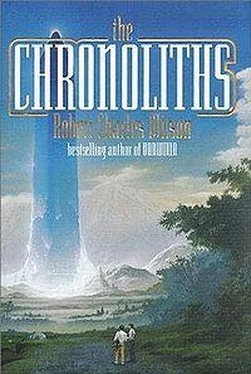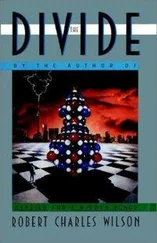“It’s not bullshit. It’s not just conjectural, either. Admittedly, I’m interpreting, but the math suggests—”
“I really don’t care what the math suggests.”
“Then just listen to me, and I’ll tell you what I think is the truth.”
She looked away, her eyes distantly focused. I didn’t like the expression on her face. It was earnest and aloof, almost inhuman.
“Scotty,” she said, “I don’t believe in destiny. It’s an archaic concept. People’s lives are an incredibly complex phenomenon, far less predictable than the lives of stars. But I also know that tau turbulence splashes causality up and down the timeline. Is it really a coincidence that you and Hitch both ended up working for me, or that Adam Mills shared the turbulence with us in Portillo? In either case you can construct a logical sequence of events that’s almost but not quite satisfying as an explanation. I connected with Hitch Paley through the events at Chumphon, not quite at random; you met Ashlee because both of you had children caught up in the same haj, fine. But, Scotty, step back and take a longer look. It knits together way too neatly. The antecedent causes are insufficient. There has to be a postcedent cause.”
Hitch tangling with Adam, for that matter. More than coincidence. But also uninterpretable. “That’s an item of faith,” I said softly.
“Then look at me , Scotty! Look at the power I hold in these two hands!” She turned her pale palms up. “The power to bring down a fucking Chronolith! That makes me important . It makes me a player in the resolution of these events. Scotty, I am a postcedent cause!”
“There is such a thing,” I said, “as megalomania.”
“Except I didn’t make this up, any of this! It’s not a fantasy that I happen to understand Chronolith physics as well as anyone on the planet — and I’m not being vain, either. It’s not a fantasy that you and Hitch were at Chumphon and Portillo or that you and I were at Jerusalem. Those are facts , Scotty, and they demand an interpretation that goes beyond happenstance and blind chance.”
“Why do you want me in Wyoming?”
She blinked. “But I don’t. I don’t want you there. You’re probably safer here. But I can’t ignore the facts, either. I believe — and yes, this is intuition, probably unscientific, but I don’t care — I believe you have a role to play in the endgame of the Chronoliths. For good or ill, I don’t really know, though I’m sure you wouldn’t do anything to hurt me or to further the interests of Kuin. I think it would be better if you came with us because you carry something special with you. The fact of Adam Mills is like a billboard. Chumphon, Jerusalem, Portillo, Wyoming. You . You may not like it, Scotty, but you matter .” She shrugged. “That’s what I believe, and I believe it very fervently. But if I can’t convince you to come, you won’t come, and maybe that’s what our destiny is, maybe that’s how we’re tied together, by your refusal.”
“You can’t put that weight on me.”
“No, Scotty, I can’t.” She blinked sadly. “But I can’t take it away, either.”
None of this sounded quite sane to me. No doubt because of my mother, I had developed a sensitive ear for the irrational. Even as a child I had known at once when my mother began to veer into madness. I recognized the grandiose assertions, the inflated self-importance, the hints of imminent threat. And it always provoked the same reaction in me, a withdrawal verging on disgust, a rapid emotional deep-freeze.
“Do you remember Jerusalem?” Sue asked. “Remember those young people, the ones who were killed? I think of them often, Scotty. I think of that young girl who came to me just when the Chronolith was arriving, when the tau turbulence was peaking. Her name was Cassie. Do you remember what Cassie said?”
“She thanked you.”
“She thanked me for something I hadn’t done, and then she died. I think it’s possible she was as deep in the tau turbulence as anyone can be, that the fact of her death had spilled over into the last minutes of her life. I don’t know exactly why she thanked me, Scotty, and I’m not sure she knew, either. But she must have sensed something… momentous.”
Sue turned her eyes away from me almost sheepishly, an expression that returned us to the scale of the merely human. “I need to live up to that,” she said. “At least, I need to try.”
Every two people who have ever fallen in love have a special place. A beach, a back yard, a park bench by a library. For Ashlee and me it was a landscaped park a few blocks east of our apartment, an ordinary suburban park with a concrete-rimmed duck pond and a playground and a cut-grass softball field. We had come here often in the days after Portillo, when Ash was recovering from the loss of Adam and after I had severed my contacts with Sue and company.
I had proposed marriage to her here. We had brought food for a picnic, but storm clouds came careening over the horizon and rain began to fall suddenly and copiously. We ran as far as the softball field and sheltered on the roofed bleachers. The air grew colder and the wet wind prompted Ashlee to curl against my shoulder. The park’s huge elms reared back from the storm, branches laced like fingers together, and I chose that moment to ask Ashlee whether she would consent to be my wife, and she kissed me and said yes. It was as simple and as perfect as that.
I took her there again.
The city had created perhaps too many of these parks in the urban-upgrade mania of the early century. Several had been rezoned for poverty housing or had deteriorated beyond all utility. This one was an exception, still stubbornly claimed by local families, defended by a host of local ordinances, patrolled after dark by community volunteers. We arrived in the late afternoon of a day cooler than the scorching day before, the kind of summer day so fine you want to fold it up and put it in your pocket. There were picnickers by the pond, toddlers swarming over the recently repainted swing sets and climbing gear.
We sat down on the untenanted softball bleachers. We had bought takeout food on the way to the park, stringy little chicken pieces fried in batter. Ashlee picked at hers listlessly. Her unease was obvious in every gesture. I suppose mine was, too.
I had originally planned (at least, perhaps) to tell her about Adam today. Lately I had understood that I wouldn’t. It was a decision by default, arguably a failure of courage. I still believed Ash deserved to know Adam was alive. But Sue was right, too. The news would hurt more than it would heal.
I couldn’t bring myself to hurt Ash that badly, much as my conscience protested.
It’s out of decisions like this, I suppose, that fate is constructed, board and nails, like a gallows.
“You remember the boy?” Ashlee asked, dabbing her lips with a napkin. “The little boy in the ball game?”
We had come here one Saturday not long after our wedding. There had been a Little League practice game in progress, two coaches and a few parents sharing the bleachers with us. The batter was a kid who looked like he’d been raised on steak and steroids, the kind of eleven-year-old who has to shave before school. The pitcher, contrarily, was a fair-haired waif with a talent for sinker balls. Unfortunately he left one up and over the plate. The ball came off the bat and back to the mound before the elfin pitcher had time to get a glove up — something off toward first base had distracted him — and as he turned his head he was struck squarely in the temple.
Silence, then gasps and a couple of screams. The pitcher blinked at the ground and fell, fell loose-limbed and suddenly, and lay motionless on the bare dirt patch that served as a mound.
Читать дальше












